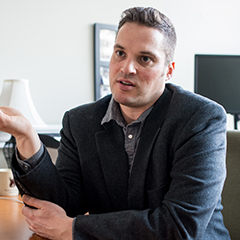
The first lecture, entitled Evolution of Cooperation and Confrontation will be presented by Ilan Fischer. He is a social and cognitive psychologist, who completed his Ph.D. at the University of Haifa, studying decision making and meta cognition. He spent several years at University College London and Ben-Gurion University, before returning to the University of Haifa where he currently works. He studied cognitive aspects of decision making, such as: fallacies and biases, meta cognition (calibration and resolution), advice taking, and the perception of random sequences. Dr Fisher’s main work is in the field of behavioral game theory. He developed and validated the theory of Subjective Expected Relative Similarity (SERS), which explains and predicts human behavior in the Prisoner’s Dilemma game, as well as in many other Similarity Sensitive Games (SSGs). Together with colleagues from Israel, US and Germany (including the late Nobel laureate Prof. Reinhard Selten) he developed the Mimicry and Relative Similarity (MaRS) evolutionary strategy, a computerized algorithm that outperforms many potent strategies. Following the outbreak of Covid-19, he headed an international team of researchers from Israel, Poland, Germany and the US that developed behavioral tools, helping to enhance compliance to health instructions. The group developed an integrative approach, based on Indirect Measurements and Personalized Attitude Changing Treatments (IMPACT). His recent work, involves the development of novel tools and methods for the study and the forecast of international conflicts, such as the Brexit in the UK, the Israeli-Palestinian conflict, or the integration of immigrants in Germany and the US.

Current Research on Online Sexual Offending – an Overview will be the lecture given by Michael C. Seto. He is a research director with the Royal Ottawa Health Care Group and a Professor in Psychiatry at the University of Ottawa, as well as a registered clinical and forensic psychologist. He received his Ph.D. in Clinical Psychology from Queen’s University in Kingston, Ontario, Canada in 1997. Dr. Seto has published extensively on pedophilia, sexual offending against children (also by mentally disordered and adolescent offenders), and online offending. He developed and validated tools for the purpose of risk assessment in sexual offenders: the Screening Scale for Sexual Interest (SSPI, SSPI-2) and the Child Pornography Offender Risk Tool (CPORT). He is an author of over 200 articles and book chapters and has written well-reviewed books: Pedophilia and sexual offending against children (2008, second edition in 2018) and Internet sex offenders (2013), all published by the American Psychological Association. Dr Seto’s research has been funded by the Oak Foundation, Tiny Foundation, Canadian Institutes of Health Research, Social Sciences and Humanities Research Council, Ontario Mental Health Foundation, Correctional Services Canada, and the Mental Health Commission of Canada. He regularly presents at scientific meetings and professional workshops (for e.g., Ontario Provincial Police, Federal Bureau of Investigation, National Center for Missing and Exploited Children in the US, and the Thorn Foundation) on these topics. He also serves as the Editor-in-Chief of Sexual Abuse, and is on the editorial boards of Archives of Sexual Behavior, Journal of Sex Research, Canadian Journal of Human Sexuality, Law and Human Behavior, International Journal of Forensic Mental Health, and Psychological Assessment. In 2018 he received the lifetime significant achievement award from the Association for the Treatment of Sexual Abusers and in 2020 – the Donald O. Hebb Award for Distinguished Contributions to Psychology as a Science, from the Canadian Psychological Association.

The lecture entitled Self-Control, Willpower, and Ego Depletion: Gradual Emergence of a Theory will be delivered by Roy F. Baumeister. He is one of the world’s most esteemed and influential psychologists – the Institute for Scientific Information lists him among the handful of most cited psychologists in the world. R. F. Baumeister received his Ph.D. in social psychology from Princeton in 1978 and did a postdoctoral fellowship in sociology at the University of California at Berkeley. He has held professorial roles at Florida State University and spent over two decades at Case Western Reserve University. He has also worked at the University of Texas, the University of Virginia, the Max-Planck-Institute, the VU Free University of Amsterdam, the University of California at Santa Barbara, and Stanford’s Center for Advanced Study in the Behavioral Sciences. He currently holds the title of Emeritus Professor of Psychology at the University of Queensland in Brisbane, Australia, as well as at Florida State University (USA), and he also has affiliations with the University of Bamberg (Germany) and Jacobs University (Germany). Prof. Baumeister’s research spans multiple topics, including self and identity, self-regulation, interpersonal rejection and the need to belong, thinking about the future, sexuality and gender, aggression, self-esteem, meaning, free will, consciousness, and self-presentation. He has published well over 700 scientific articles and more than 40 books, including Evil: Inside Human Violence and Cruelty (W. H. Freeman, 1996), The Cultural Animal: Human Nature, Meaning, and Social Life (Oxford University Press, 2005), Meanings of Life (The Guilford Press, 1991), and Willpower: Rediscovering the Greatest Human Strength (Penguin Press, 2011). He has received research grants from the National Institutes of Health and from the Templeton Foundation. In 2013, R. F. Baumeister received the highest award given by the Association for Psychological Science, the William James Fellow award, in recognition of his lifetime achievements. He has also received lifetime achievement awards from the Society for Personality and Social Psychology and from the International Society for Self and Identity.

The lecture entitled Dynamics of Personality and Psychopathology will be presented by Christopher J. Hopwood. He is Professor of Personality Psychology at the University of Zurich. He received his Ph.D. from Texas A&M University and completed his doctoral internship at Harvard Medical School/Massachusetts General Hospital. He was formally on the faculty of Michigan State University and the University of California, Davis. He has published extensively on clinical assessment, personality disorders, and interpersonal processes, and has written or edited several books on personality assessment and personality disorders designed to translate research findings into clinical practice (among others: Personality Assessment in the DSM-5, Routledge, 2013; Multimethod Clinical Assessment, Guilford, 2014; The DSM-5 Alternative Model of Personality Disorders: Integrating multiple paradigms of personality assessment, Routledge, 2019). His work has been funded by the National Institutes of Mental Health, the National Institutes of Drug Abuse, the International Psychoanalytic Association, Animal Charity Evaluators, and the Humboldt Foundation. He has been an associate editor at the Journal of Personality and Social Psychology, Journal of Personality Assessment, Journal of Personality Disorders, and Assessment, and has served on the editorial boards of several other journals. He has also served on the professional boards of the Society for Interpersonal Theory and Research, Society for Personality Assessment, and North American Society for the Study of Personality Disorders, and is a founding member of the Personality Change Consortium and the Society for the Psychology of Human Animal Intergroup Relations.

The last lecture in the series is Treatment for Borderline Personality Disorder: Clinical, Ethical, and Empirical Considerations by Kenneth N. Levy. He is a certified Transference-Focused Psychotherapy (TFP) therapist and supervisor and a tenured Professor in the Clinical Area of the Department of Psychology at the Pennsylvania State University, where he is the Associate Director of Clinical Training and the Director of the Laboratory for the Study of Personality, Psychopathology, and Psychotherapy. Over the last 20 years, Dr Levy has taught and supervised the clinical training of over 75 doctoral and postdoctoral students in the practice of TFP. Dr Levy also has a faculty appointment in the Department of Psychiatry at the Joan and Sanford I. Weill Medical College of Cornell University where he taught prior to taking a faculty position at Penn State. At Cornell he is a Senior Faculty Fellow, Steering Committee member, and the Associate Director of Research at the Personality Disorders Institute (PDI) under the direction of Drs Otto F. Kernberg, John F. Clarkin, and Frank E. Yeomans. Dr Levy’s research interests are in attachment theory, personality disorders and psychotherapy process and outcome. His goal is to understand the mechanisms involved in the development and maintenance of personality disorders, with the ultimate goal of developing and studying treatments that directly target these mechanisms. Dr Levy has authored more than 175 articles and chapters and three books (Relatedness, self-definition, and mental representations: Essays in honor of Sidney J. Blatt, 2005, Brunner-Routledge; Case studies in abnormal psychology, 2017, Sage; Borderline Personality Disorder, Psychiatric Clinics of North America, 2018, Saunders). He has published in a number of top tier journals such as the American Journal of Psychiatry, Development and Psychopathology, the Journal of Consulting and Clinical Psychology, and Psychological Science. He has also made almost 400 conference presentations, colloquia, grand rounds, and workshops, including keynotes and plenary addresses. Dr Levy has served as a science advisor to the President of the American Psychoanalytic Association (APsA) and a research consultant to the American Academy of Child and Adolescent Psychiatry Psychotherapy Committee, as the Ittelson Fellow to the Group for Advancement of Psychiatry (GAP), and as an advisor to former Senator Patrick Kennedy and the Kennedy Forum. He is also a member of the Committee on Scientific Activities of the APsA and is a fellow of the American Psychological Association, Division 12 (Clinical Psychology), 29 (Psychotherapy), and 39 (Psychoanalysis), the Association for Psychological Science (APS), and the Society for the Exploration of Psychotherapy Integration (SEPI).
© 2023 All Rights Reserved